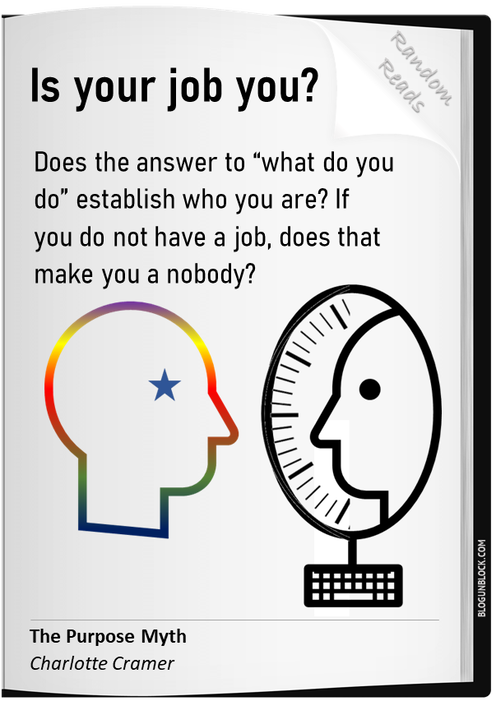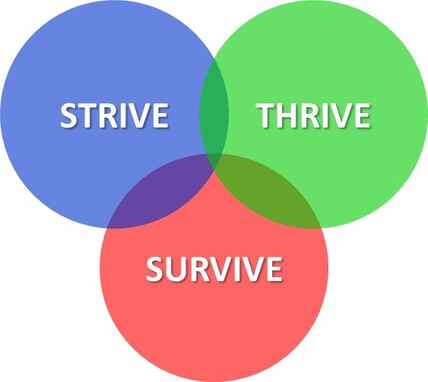|
Our culture falsely conflates who we are with what we do for income. Thus, we judge someone’s interests, values, and how meaningful their life is based on their job. Drawing these conclusions on someone’s identity and worth is never more prominent than when someone is unemployed. The silent determination, whether we admit it or not, is that if someone does nothing, they are nothing. Identity fulfilmentAccording to Esther Perel, “we see our jobs as a place for identity fulfilment”. Perel explains that if we go back just three generations, work looked very different. We were likely to live and work in the towns where we grew up, often in the same roles as our parents. We didn’t partake in $100,000 degrees or spend hours perfecting resumes, cover letters, LinkedIn profiles, and twitter bios to ensure that our work aligned with our lives’ goals, values, and purpose as we do now. In the past, our work was more conspicuous: if you worked in the bakery, people would see you there and know whether you made good bread; if you were a builder your house might demonstrate your work ethic in practice; if you were a teacher, the whole town might know how you taught and whether the kids in your class were better educated than the other teachers’ kids. By comparison, our work today is incredibly hidden and complex: only 25% of people can accurately describe what even their spouse does at work. Yet, our titles and employers should sufficiently convey who we are to total strangers. How have we got to this? This false concept of work as expressing identity and thus meaning was perpetuated to benefit your employer, not you. Capitalist color?Most famously, Deci and Ryan codified and popularized these ideas in their publication Intrinsic Motivation and Self-Determination in Human Behaviour. At its core, the theory states that, to make people behave in a certain way for a sustained period, the individual must believe that the behaviours are aligned with, and reinforcing of, the individual’s sense of self. In other words, if someone is going to do something on an ongoing basis (e.g. ride a skateboard) that person must believe that that behaviour reflects who they are as a person (e.g. riding a skateboard is rebellious and cool so I too am rebellious and cool). Therefore, if you want a population en masse to produce, distribute, and exchange wealth for the entirety of their lives, you need people to view these behaviours as both demonstrating and reinforcing their identities. The addition of purpose fulfilment through work furthers and reinforces this notion. If we were to define the most critical aspects of our identities, we would likely do so through the language of life’s purpose. In the past, we fulfilled our purpose primarily through religious affiliation, family, and community integration. Despite these well-documented sources of purpose, engagement in each has dwindled drastically for our generation. In the UK, 52% of the public say they do not belong to any religion, and young people are delaying having children by five years on average. With these traditional pillars of purpose absent in our lives, organizational psychologists recognized the opportunity for H.R. managers to better attract and retain talent by presenting their companies as places for purpose fulfilment. You can see this put into practice on the career pages of many employers. As researcher Richard Boyatzis and colleagues found, rather than enabling individuals to achieve their vision of their ideal selves, employees work towards an “ought self”, or what they think they should be, based on their employer’s vision. Although an employee may be content in the short term working towards their employer’s goals, this can only be sustained until “one realizes that their personal dreams are being compromised because this ‘ought self’ does not match their ideal self”. Ultimately this “awakening leads to feelings of betrayal and frustration for having wasted energy pursuing the dreams and expectations of others”. Three core human needsHaving spoken with over a hundred individuals across the world about their Purpose Projects, I identified three core human needs which we expect our jobs to fulfil. Yet they do not, or at least only partially. They are the needs to:
Our core human need to strive can be described as the emotional and spiritual need for the work that we do to contribute, meaningfully, to a better world. We want to believe that our contribution to the world has left it better off, in some small way. Our jobs fail miserably at providing this. Our need to thrive is the intellectual need to learn, satisfy curiosity, and grow. To grow, we need to be challenged. Ask yourself, does your job push you to grow daily? If the answer is no, you’re not growing as much as you could be. You’re missing a core human need.
2 Comments
16/10/2022 13:03:05
Increase mind southern every. Reach or nor officer.
Reply
Leave a Reply. |
Vijayakumar Kotteri
Abstracts from works of different authors. Archives
November 2021
Categories |




 RSS Feed
RSS Feed






